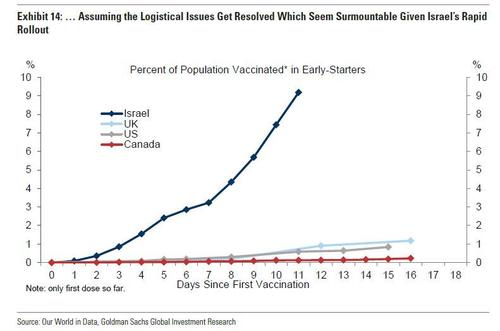In a world where the rollout of covid vaccines has been far slower than the so-called experts predicted – which is bizarre considering the plunge in public faith in the “covid scientist” sector amid the surge in horror stories involving adverse side-effects from both the Pfizer and Moderna vaccines, to which the mainstream media has finally caught on as detailed in “As COVID-19 vaccines come online, fewer Americans want to take them” – the same mainstream media has been fawning over those counties which have steamrolled through popular skepticism and opposition with authoritarian ruthlessness to unleash widespread vaccination campaigns, praising them as model nations for everyone to follow. Countries like Israel.
Case in point: in its top charts of 2020, none other than Goldman was quick to demonstrate Israel – where over 1 million people or 12% of the population has already been vaccinated – as the sole “successful” outlier in rapid vaccine rollout, and proof that “logistical issues” surrounding vaccinations can be “resolved given Israel’s rapid rollout.”
The New York Times rushed to congratulate Israel, explaining “How Israel became a world leader in vaccinating against COVID-19” in which it wrote that…
More than 10% of Israel’s population has received a first dose of a coronavirus vaccine, a rate that has far outstripped the rest of the world and buoyed the battered domestic image of the country’s leader, Benjamin Netanyahu, at a critical juncture.
Israel’s campaign, which began Dec. 20, has distributed the vaccine to three times as much of its population as the second-fastest nation, the tiny Persian Gulf kingdom of Bahrain, according to figures compiled mostly from local government sources by Our World in Data.
By contrast, less than 1% of the population of the United States and only small fractions of the population in many European countries received a vaccine dose by the end of 2020, according to Our World in Data, though China, the United States and Britain have each distributed more doses overall.
In short: Israeal great and shining example of how to force millions to get injected with some mRNA, while the US (and orange man of course) bad.
Which would be fantastic, if only it wasn’t for the ideologically-mandated and rushed conclusion, which is laughable at best and potentially lethal at worst because just as Israel has been scrambling to get everyone vaccinated with substances whose side effects are still very much unknown, the Times of Israel reported that over two hundred Israeli citizens have been diagnosed with the disease days after getting the Pfizer/BioNTech shots. The number of those who got Covid-19 despite being vaccinated was at around 240 people, according to data from the Times of Israel
According to the official explanation provided by the Israeli media, while the Pfizer/BioNTech vaccine doesn’t contain the coronavirus and can’t infect the recipient, time is needed for the genetic code in the drug to train the immune system to recognize and attack the disease. The course of the US-made vaccine requires two shots. According to the studies, immunity to Covid-19 increases only eight to ten days after the first injection and eventually reaches 50 percent. The second shot is administered 21 days from the first one, while the declared immunity of 95 percent is achieved only a week after that. And, of course, there’s still a five percent chance of getting infected even if the vaccine is at its full potential.
This is why the second dose of the vaccine, given 21 days after the first, is critical: It strengthens the immune system’s response to the virus, bringing it to 95% effectiveness and ensuring that immunity lasts. This level of immunity is only reached about a week after the second dose — or 28 days after the first.
In other words, anyone who is infected a few days before getting the vaccine’s first dose or in the weeks before full effectiveness is reached is still in danger of developing symptoms. (Even when the vaccine reaches its top potential, there remains a 5% chance of this.) It wasn’t immediately clear what other symptoms those receiving the rushed vaccine shots may have demonstrated.
For those wondering how Israel has been able to mount such a rapid and aggressive vaccination campaign, the Times of Israel explains that the country’s “heavily digitized, community-based health system — all citizens, by law, must register with one of the country’s four HMOs — and its centralized government have proved adept at orchestrating a national inoculation campaign, according to Israeli health experts.”
With a population of 9 million, Israel’s relatively small size has played a role as well, said Balicer, who is also the chief innovation officer for Clalit, the largest of the country’s four HMOs.
An aggressive procurement effort helped set the stage.
The health minister, Yuli Edelstein, said in an interview Friday that Israel had entered into negotiations with drugmakers as an “early bird,” and that the companies were interested in supplying Israel because of its HMOs’ reputation for efficiency and gathering reliable data.
“We are leading the world race thanks to our early preparations,” he said.
True, meanwhile the world is also looking at Israel with great interest due to the country’s decision to make itself a gunniea pig for the rest of the world in the most rapid administration of vaccines which have been developed in record time and have never been used before. Meanwhile, since vaccinations kicked off on December 20, at least four people in Israel died shortly after getting the short, Kan public broadcaster reported. However, the Health Ministry said that three fatalities were unrelated to the vaccine, with the fourth case of an 88-year-old man with preexisting conditions currently being investigated.
